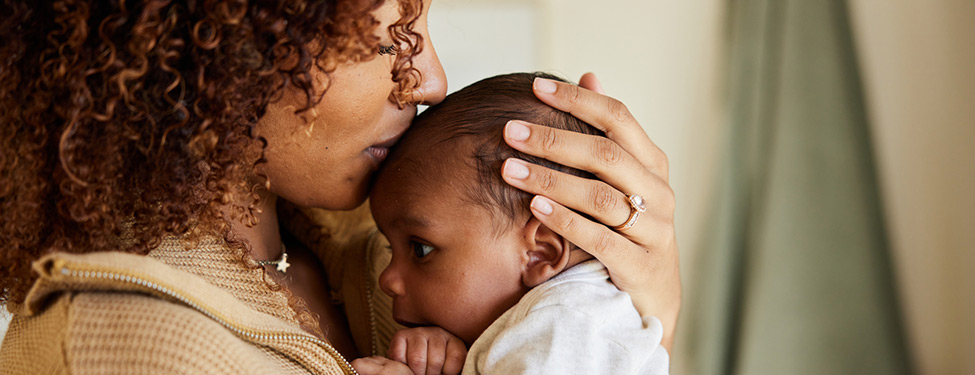Discharge Instructions: Caring for Your Baby

Bringing your baby home is very exciting, but it can also be very stressful. It is not uncommon for mothers to feel overwhelmed with the idea of caring for a new baby. Your OB/GYN, your child’s pediatrician and Baptist Women’s Hospital are here to help you and your child make the transition from hospital to home. Here are some guidelines for caring for your baby.
When To Call Your Baby's Doctor
Please call your child’s pediatrician immediately if you notice any of these symptoms:
- Rectal temperature of 100.4° F or higher
- Signs of infection such as redness, oozing or foul smell from baby's cord, eyes, or circumcision
- Unusually sleepy or hard to wake up
- Crying constantly and not able to be soothed
- Vomiting after more than one feeding
- Less than five wet diapers in 24 hours
- Diarrhea or constipation
- Baby refuses two or more feedings
- Change in skin color such as yellow, very pale, or dusky-bluish skin (especially blue color around the lips)
- Unusual rash anywhere on the body
- You are breastfeeding and your milk supply has not increased within five days
How To Use the Bulb Syringe
If your baby has excessive mucus in the nasal passages or throat, use a bulb syringe to remove the blockage
- Squeeze the bulb
- Gently place tip in opening of nose or inside cheek
- Release the bulb for suction
- Remove the bulb and squeeze into a cloth to empty it
- Repeat if necessary
Diapering and Cord Care
- Always wash your hands before and after changing baby
- Wipe from front to back using a clean cloth each time; clean between skin folds
- If the cord gets soiled, clean gently with mild soap and water and pat dry
- Keep the cord exposed to air as much as possible; fold the diaper down if needed
- It may take two weeks or more for the cord to heal; no tub baths until it heals completely
Circumcision Care
- The area may be red and swollen for a few days; it should heal completely in 10-14 days
- Apply petroleum jelly (i.e., Vaseline™) to the penis and to the part of the diaper that comes into contact with it until it heals (NOTE: If your baby has a Plastibell circumcision, no ointment is needed)
- A yellow discharge at the head of the penis will form. This is normal; do not wipe off.
- If your baby has a Plastibell circumcision, the plastic rim will fall off by itself in 8 days: call your pediatrician if it has not.
- Call your pediatrician if redness, bleeding, drainage, or swelling occur
Crying and Calming
Crying is how your baby communicates when they are hungry, need burping or something doesn’t feel right. Crying is also an indication that your baby may be sleepy, too. Newborns need many hours of sleep each day, usually in 2-4 hour stretches. When your baby cries, try feeding them or checking their diaper. If your baby is not hungry or the diaper is dry, then try the following:
- Hold your baby on your chest. Skin-to-skin contact is calming.
- Swaddle carefully allowing the baby to move the legs and shoulders
- Hold your baby while gently rocking or swaying. Make the room quiet and dark. Using "white noise" (like a fan) may help.
- Have a plan to get help. Your partner or family/friend can help when you get tired.
- Always call your pediatrician if crying is excessive. There may be a medical reason why your baby is crying.
Shaken Baby Syndrome: Protect Your Infant from Abusive Head Trauma
One of the skills all parents and caregivers need to learn is how to cope with stress. This is especially important when there seems to be no end to a baby's crying. Reacting impulsively in anger or frustration can be harmful or deadly.
Babies are not yet able to fully support their heads, and violent and forceful shaking or striking can injure a baby's brain. This type of serious head injury is called abusive head trauma, and it is a form of child abuse. Too often, abusive head trauma leads to the death of a baby. It also can lead to:
- Brain damage
- Bleeding around the brain
- Blindness
- Hearing loss
- Speech or learning disabilities
- Seizures
- Intellectual disability (formally called mental retardation)
- Cerebral palsy
When Your Baby Cries, Take A Break
Crying is the only way babies know how to express their needs. Parents and caregivers need to know that crying does not mean babies dislike them. Babies usually cry when they need something. They may be hungry or tired. They may be cold or hot or need their diaper changed. However, sometimes babies cry for no clear reason. Healthy babies, even those who are well cared for and loved, may cry for as long as 1 to 2 hours. When you have tried to calm your crying baby, but nothing seems to work, you may need to take a moment for yourself. A crying baby can be tough to handle, especially if you are physically tired and mentally exhausted. If you feel like you are getting angry and might lose control, try the following:
- Take a deep breath and count to ten.
- Place your baby in a safe place, such as a crib or playpen without blankets and stuffed animals; leave the room and let your baby cry alone for about 10 to 15 minutes.
While your baby is in a safe place, consider some actions that may help calm you. For example:
- Listen to music for a few minutes.
- Call a friend or family member for emotional support.
- Do simple household chores, such as vacuuming or washing the dishes.
If you have not calmed down after 10 to 15 minutes, check on your baby but do not pick up your baby until you feel you have calmed down. Try to be patient. Keeping your baby safe is the most important thing you can do. It is normal to feel upset, frustrated or even angry, but it is important to keep your behavior under control.
When you have calmed down, go back, and pick up your baby. If your baby is still crying, try soothing measures again. If the crying becomes excessive, call your pediatrician.
It is never safe to shake, throw, hit, slam, or jerk any child—and it never solves the problem.


